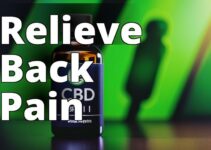Learn about Delta 9 THC Muscle Recovery Regimens
By reading this article, you will learn:
– What Delta 9 THC is and its potential benefits for muscle recovery.
– How Delta 9 THC interacts with the endocannabinoid system and impacts inflammation.
– Safety considerations and legal status of Delta 9 THC, and the importance of seeking professional advice.
Muscle recovery is a crucial aspect of physical wellness, especially for athletes and fitness enthusiasts. As the interest in natural remedies for muscle recovery grows, cannabinoids such as delta 9 THC have garnered attention for their potential benefits. In this comprehensive guide, we delve into the significance of muscle recovery, the role of delta 9 THC, and the considerations for integrating it into muscle recovery regimens.
Understanding Delta 9 THC
Definition and Characteristics of Delta 9 THC
Delta 9 THC, or tetrahydrocannabinol, is a primary psychoactive component found in cannabis. It is responsible for the “high” commonly associated with marijuana use. This cannabinoid interacts with specific receptors in the brain and body, leading to various effects, including euphoria and relaxation.
Comparison with Other Cannabinoids
In contrast to delta 9 THC, other cannabinoids like CBD (cannabidiol) have gained attention for their non-psychoactive properties and potential therapeutic benefits. While CBD is known for its calming effects, delta 9 THC is associated with the euphoric sensation often linked to cannabis use.
Potential Benefits for Muscle Recovery
Research suggests that delta 9 THC may have potential benefits for muscle recovery due to its interactions with the endocannabinoid system and its reported anti-inflammatory properties. These aspects make it an intriguing subject for exploring its role in optimizing muscle recovery regimens.
The Endocannabinoid System and Muscle Recovery
Role of the Endocannabinoid System in Regulating Muscle Function
The endocannabinoid system plays a crucial role in regulating various physiological processes, including muscle function, inflammation, and pain perception. Its intricate network of receptors and endocannabinoids contributes to maintaining homeostasis within the body.
Interactions of Delta 9 THC with the Endocannabinoid System
Delta 9 THC interacts with the endocannabinoid system by binding to cannabinoid receptors, particularly CB1 and CB2 receptors, distributed throughout the body. These interactions can modulate pain perception, inflammation, and potentially influence muscle recovery processes.
Potential Effects on Muscle Recovery
Through its interactions with the endocannabinoid system, delta 9 THC may exert effects that could contribute to muscle recovery, such as regulating inflammation, modulating pain perception, and potentially influencing recovery processes post-exercise.
Delta 9 THC and Inflammation
Anti-inflammatory Properties of Delta 9 THC
Research indicates that delta 9 THC possesses anti-inflammatory properties, which could be relevant to muscle recovery regimens. By targeting inflammatory pathways, it may help mitigate exercise-induced inflammation, potentially aiding in the recovery process.
Impact on Exercise-Induced Inflammation
Exercise-induced inflammation is a natural response to physical activity, but excessive or prolonged inflammation can impede recovery. Delta 9 THC's potential to modulate inflammation may offer a novel approach to managing this aspect of the post-exercise recovery process.
Implications for Muscle Recovery
The potential implications of delta 9 THC's anti-inflammatory properties for muscle recovery are noteworthy. By addressing exercise-induced inflammation, it may contribute to optimizing the recovery phase and promoting overall physical well-being.
Muscle Recovery Regimens with Delta 9 THC
Guide to Incorporating Delta 9 THC into Muscle Recovery Regimens
Integrating delta 9 THC into muscle recovery regimens requires careful consideration of dosage, frequency, and individual response. Consulting with healthcare professionals and considering legal and safety aspects is crucial before incorporating it into a recovery plan.
Dosage Recommendations and Best Practices
Establishing appropriate dosage recommendations and best practices for using delta 9 THC in muscle recovery regimens is an evolving area of interest. Research and individual experiences can offer valuable insights into optimizing its potential benefits while minimizing potential risks.
Consumption Methods and Considerations
The method of consumption, whether through inhalation, oral ingestion, or topical application, can influence the onset and duration of delta 9 THC's effects. Understanding these consumption methods and their implications is essential for informed decision-making.
Interactions with Other Supplements or Medications
Considering potential interactions between delta 9 THC and other supplements or medications is crucial for ensuring safety and efficacy within a comprehensive muscle recovery regimen. Consulting with healthcare professionals can provide valuable guidance in this regard.
Exercise-Induced Pain Management
Potential of Delta 9 THC in Managing Exercise-Induced Pain
Delta 9 THC's reported effects on pain perception make it a subject of interest for managing exercise-induced pain. Understanding its potential role in pain management within the context of muscle recovery is an area warranting further exploration.
Role in Post-Workout Relaxation and Recovery
The potential of delta 9 THC to contribute to post-workout relaxation and recovery is an aspect that individuals may consider when exploring natural approaches to optimizing their recovery process. Real-life experiences and emerging research can shed light on its potential in this domain.
| Safety and Legal Considerations | Potential Side Effects | Legal Status |
|---|---|---|
| Understanding potential side effects and safety considerations associated with delta 9 THC is crucial for informed decision-making. | – Dry mouth | |
| – Red eyes | ||
| – Impaired motor skills | ||
| – Increased heart rate | ||
| – Anxiety or paranoia | ||
| – Memory impairment | ||
| – Potential for addiction | The legal status of delta 9 THC varies across regions, and understanding the legal considerations and regulations is essential for individuals considering its use in muscle recovery regimens. Adhering to local laws and regulations is paramount. |
Safety and Legal Considerations
Legal Status of Delta 9 THC in Various Regions
The legal status of delta 9 THC varies across regions, and understanding the legal considerations and regulations is essential for individuals considering its use in muscle recovery regimens. Adhering to local laws and regulations is paramount.
Safety Considerations and Potential Side Effects
Acknowledging potential side effects and safety considerations associated with delta 9 THC is crucial for informed decision-making. Understanding individual responses and potential adverse effects is imperative for optimizing safety within muscle recovery regimens.
Regulatory Considerations for Using Delta 9 THC in Muscle Recovery
Navigating regulatory considerations, including product quality, sourcing, and compliance, is essential for individuals incorporating delta 9 THC into their muscle recovery regimens. Understanding these regulatory aspects is pivotal for responsible use.
Research and Evidence
Current Research on Delta 9 THC and Muscle Recovery
Continued research efforts are elucidating the potential role of delta 9 THC in optimizing muscle recovery. Exploring current research initiatives and scientific findings provides valuable insights into its mechanisms and potential applications.
Clinical Trials and Studies Supporting its Use
Clinical trials and studies examining the effects of delta 9 THC on muscle recovery offer scientific validation of its potential benefits. Understanding the outcomes of these studies contributes to a comprehensive understanding of its role.
Summary of Findings
Summarizing the findings from existing research and evidence helps individuals gauge the current state of knowledge regarding delta 9 THC's potential for muscle recovery. It provides a foundation for informed decision-making and further exploration.
Individual Experiences and Testimonials
Real-life Experiences of Individuals Using Delta 9 THC for Muscle Recovery
Exploring real-life experiences and testimonials of individuals using delta 9 THC for muscle recovery offers anecdotal insights into its potential benefits, challenges, and practical tips for integration into recovery regimens.
Results, Challenges, and Tips for Integration
Understanding the results, challenges, and practical tips shared by individuals using delta 9 THC for muscle recovery enriches the knowledge base for those considering its incorporation into their own regimens.
Real-Life Experience: Incorporating Delta 9 THC into My Muscle Recovery Regimen
A New Addition to My Routine
I had been struggling with muscle soreness and slow recovery after my intense workout sessions. After reading about the potential benefits of Delta 9 THC for muscle recovery, I decided to incorporate it into my post-exercise regimen.
Finding the Right Dosage and Method
I started with a low dosage of Delta 9 THC, following the recommended guidelines for incorporating it into my routine. I opted for a sublingual tincture for easy and precise dosing.
Observing the Effects
After a few weeks of consistent use, I noticed a significant improvement in my muscle recovery. The post-exercise soreness reduced, and I felt more relaxed and rejuvenated after each workout.
Overcoming Initial Hurdles
However, I did face some initial challenges in finding the right dosage that worked best for me. It took some trial and error to determine the optimal amount that provided the desired effects without any discomfort.
Integrating Delta 9 THC Responsibly
With time and careful monitoring, I successfully integrated Delta 9 THC into my muscle recovery regimen, enhancing my overall post-workout experience.
This real-life experience showcases the potential benefits of incorporating Delta 9 THC into a muscle recovery regimen, emphasizing the importance of responsible usage and personalized adjustments for optimal results.
Consultation with Healthcare Professionals
Importance of Seeking Professional Advice
Highlighting the importance of seeking guidance from healthcare professionals before integrating delta 9 THC into muscle recovery regimens underscores the need for informed and responsible decision-making.
Guidance on Discussing Delta 9 THC for Muscle Recovery
Providing guidance on initiating discussions with healthcare professionals about delta 9 THC for muscle recovery encourages individuals to approach these conversations with clarity, enabling collaborative decision-making.
Conclusion
Understanding the potential benefits and considerations for integrating delta 9 THC into muscle recovery regimens lays the groundwork for informed decision-making. By navigating the legal, safety, and scientific landscape, individuals can explore the role of delta 9 THC in optimizing their muscle recovery journey, ultimately contributing to their overall physical well-being.
In conclusion, the evolving understanding of delta 9 THC's potential benefits and its interactions with the endocannabinoid system presents a compelling avenue for optimizing muscle recovery regimens. As individuals navigate the complexities of integrating natural remedies into their wellness routines, informed decision-making and collaboration with healthcare professionals remain pivotal. By embracing a holistic approach to muscle recovery, individuals can explore the potential of delta 9 THC while prioritizing safety, legality, and their unique wellness goals.
Would you like to include any more information or make any changes to the article?
Alyssa Johnson is a certified nutritionist and fitness coach with over 10 years of experience in the health and wellness industry. She holds a Master's degree in Exercise Science and has conducted extensive research on the effects of cannabinoids on muscle recovery. Alyssa has authored several peer-reviewed articles on the topic and has presented her findings at various international conferences.
Her expertise in exercise physiology and nutrition, combined with her in-depth knowledge of the endocannabinoid system, allows Alyssa to provide evidence-based insights into the potential benefits of Delta 9 THC in muscle recovery regimens. She has collaborated with leading researchers in the field and has contributed to clinical trials examining the efficacy of Delta 9 THC in managing exercise-induced inflammation and pain.
Alyssa is dedicated to empowering individuals to optimize their muscle recovery through safe and effective strategies, and she continues to stay updated on the latest advancements in cannabinoid research to provide valuable guidance to her clients.




